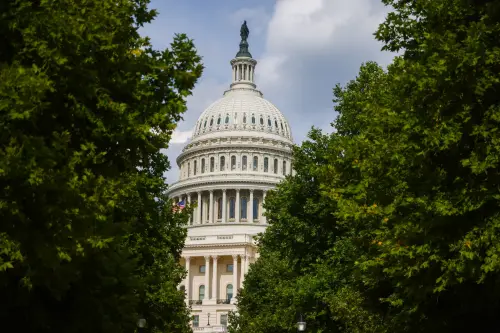The Government Accountability Office—often known as GAO, or the congressional watchdog— told Congress in April that it was conducting 39 separate investigations into the new Trump administration’s potential violations of the Impoundment Control Act, in light of the administration’s broad efforts to freeze or cancel appropriated funds.
What gives GAO the authority to conduct these investigations? How do these investigations fit into the typical scope of GAO’s appropriations work? And how does GAO’s work on appropriations law support Congress’ own oversight?
In a companion report published as part of the Katzmann Initiative on Improving Interbranch Relations and Government, we explore these and other questions through a new dataset we constructed analyzing GAO’s appropriations law decisions over the last 12 years. Our analysis examines 126 decisions considering appropriations matters raised during the last four years of the Obama administration (2013 to 2017), the four years of the first Trump administration (2017 to 2021), and the four years of the Biden administration (2021 to 2025).
GAO’s appropriations law decisions are especially important in understanding the everyday checks and balances on the executive spending power because, in ordinary times, most interbranch review of appropriations conduct in the executive branch comes through political oversight by Congress—not judicial oversight by courts.
In these extraordinary times, as President Trump and Office of Management and Budget Director Russell Vought are claiming unilateral authority to define the shape of executive branch spending, GAO’s unfolding decisions will likely help shape public debate inside and outside of Congress as well as inform litigants and courts about basic principles of appropriations law.
Our report highlights 10 findings that illustrate the complexity of interbranch relations around appropriations law and the critical role that GAO plays in safeguarding congressional intent in federal spending.
One of our key findings makes clear that the number of current investigations into potential impoundment—that is, executive branch refusals to spend appropriated money—are a stark outlier. Across the 12 years in our study, impoundment decisions were relatively sparse: There were zero decisions addressing the issue during the Obama years, eight during the first Trump administration, and two during the Biden administration. This variation is not surprising, given the new Trump administration’s campaign promise to impound and the efforts during the first Trump administration to set the stage for this action—but it is striking nonetheless.
Our findings also underscore GAO’s role as a neutral, nonpartisan arbiter of executive branch compliance with appropriations law, despite occasional claims by disappointed members of Congress that GAO favors the opposition party in the White House. For example, we found no statistically significant variation in GAO’s determinations that the Obama administration or the Trump administration had contravened appropriations law. We also found decisions that upheld controversial executive branch actions by both the Trump and Biden administrations. Our data suggest that GAO’s analysis follows where the facts go in consistent application of basic appropriations law principles.
Other findings shed light on who asks for GAO appropriations law decisions, demonstrating the important role these decisions play for Congress and agencies alike. Almost 50% of the decisions in our dataset came from requests made by Congress for GAO to investigate some aspect of executive branch compliance with appropriations law. Mostly, but not entirely, these requests were made by members of the opposition party in Congress. These requests came not only from the appropriations committees in the House and Senate but also from authorizing committees with almost as much frequency. In smaller numbers, congressional requests came from members of Congress acting in their individual (rather than committee) capacity, as well as from the budget committees.
The breadth of these requesters helps illustrate another of our findings: These decisions do not simply involve narrow, technical, accounting-style issues, but instead often address high-profile policy or political questions. For example, GAO found that the Department of Defense under the Obama administration violated a statutory notification requirement when it transferred five detainees from Guantanamo Bay to Qatar; that the Department of Defense under the first Trump administration acted within the scope of its statutory authority when it transferred funds to help build a wall at the southern border; and that the Department of Homeland Security under the Biden administration did not violate the Impoundment Control Act when it delayed use of border wall funds to complete environmental reviews and consult various stakeholders, as required by law.
Just over 40% of the decisions in our dataset came from requests made by agencies themselves. In other words, agencies affirmatively reached out to ask for GAO’s opinion on whether something they had already done—or wanted to do—was consistent with appropriations law, a remarkable request for oversight. In turn, almost 9% of the decisions in our dataset resulted from investigations GAO initiated on its own authority under either the Impoundment Control Act, which generally requires agencies to spend what Congress has appropriated, or the Antideficiency Act, which generally prohibits agencies from spending money in advance or excess of an appropriation. The proportion of decisions in our dataset that grew out of agency requests or GAO’s initiative emphasizes the important role that GAO plays in the appropriations law ecosystem even beyond providing information to Congress on request.
Our report also contains two additional findings about timeliness and agency cooperation that help put the current moment in context. As to timeliness, our data show that it can take GAO a long time to issue a decision, an average of 436 days across the 126 decisions we reviewed. While GAO appears to issue decisions on more serious matters with more speed, the average length of time for that subset was still more than 255 days. The reasons for this length of time make sense; conducting a factual investigation can be complex even with executive branch cooperation, and researching the intersection of appropriations provisions, authorizing laws, framework statutes, and GAO precedent can be tricky. The volume of investigations GAO is currently conducting provides another explanation for why GAO has not yet resolved all of its open investigations into the current administration’s appropriations conduct. At the same time, speedier conclusions would both facilitate congressional oversight and provide potentially useful information to agencies, courts, and the public.
As to cooperation, agency responsiveness to GAO’s requests for information and legal views was the norm across all three administrations in our dataset. In the 126 decisions we reviewed, there were only three instances—all during the first Trump administration—in which an agency declined to provide the information GAO had requested. This norm of cooperation helps facilitate GAO’s analysis of the relevant facts and law.
We close by offering one final observation that ties together our report’s findings on interbranch cooperation and GAO’s role as a neutral, nonpartisan arbiter with the current moment. While GAO relies on voluntary compliance from executive branch and agency officials to deliver on its congressional mandates, this foundational norm may be under strain as GAO issues its decisions on pending appropriations law matters involving the new administration.
On May 22, 2025, GAO published its first decision evaluating the current administration’s appropriations conduct, concluding, in part, that Trump’s Department of Transportation had violated the Impoundment Control Act when, shortly after the new administration took office, it withheld appropriations for an electric vehicle grant program authorized by the 2021 Infrastructure Investment and Jobs Act (IIJA). Notably, the decision also concluded that Biden’s Department of Transportation had violated the recording statute for the four fiscal years between 2022 and 2025 when it treated signed project agreements as the point of obligation rather than the timeline contemplated by the IIJA. The decision also described ordinary cooperation between the Department of Transportation and GAO in the investigation.
The day after the decision was issued, and notwithstanding the decision’s findings of appropriations law violations in both the Biden and Trump administrations, OMB Director Vought publicly denounced GAO’s findings on X and characterized the agency as partisan, comments that have since been echoed by a growing chorus of Senate Republicans. OMB General Counsel Mark Paoletta subsequently issued a letter to GAO calling GAO’s requests for information “voluminous, burdensome, and inappropriately invasive,” and saying that OMB would “continue to cooperate with GAO engagements but will do so in a manner that ensures that the burdens of such engagements do not unduly impede OMB’s ability to implement the President’s agenda and comply with OMB’s other legal duties.”
How will these initial responses affect the willingness or ability of agencies to participate voluntarily in GAO’s investigations? To what extent will executive recalcitrance hinder GAO’s—and Congress’—oversight efforts?
Just this week, GAO issued two additional appropriations law decisions about the current administration’s actions, finding a violation of the Impoundment Control Act in one but not in the other; one agency in question declined to provide certain information about spending plans and the other agency declined to respond to GAO at all. Will GAO be able to continue to issue appropriations law decisions based only on publicly available information if agencies increasingly withhold critical information?
At the very least, these responses suggest that as GAO works through its unprecedented slate of pending Impoundment Control Act and other investigations, the agency’s institutional reputation, and the longstanding norms of interbranch cooperation that sustain its work, will be tested.
We will be keeping a close eye on GAO’s appropriations law portal for additional decisions. We hope that the analysis provided in our report will help make sense of those decisions as they appear.
The Brookings Institution is committed to quality, independence, and impact.
We are supported by a diverse array of funders. In line with our values and policies, each Brookings publication represents the sole views of its author(s).










Commentary
New data on GAO’s role in appropriations oversight
June 18, 2025